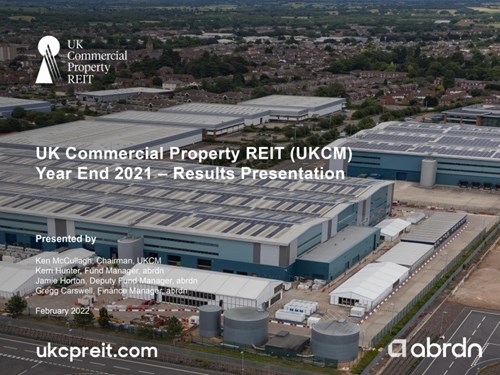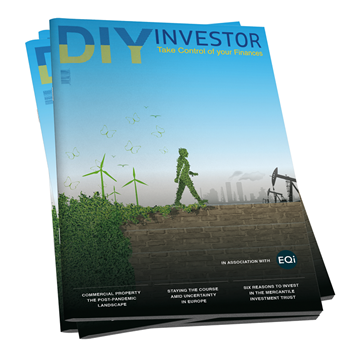Commercial property: the post-pandemic landscape

- After a tough pandemic, commercial property recovered significantly in 2021
- Industrials led the way, while segments of the retail and office markets remained weak
- The outlook for individual sectors within commercial property is diverging with asset selection increasingly important
Commercial property was one of the success stories of 2021, as investors returned to the sector in search of inflation-adjusted income and diversification. However, performance was polarised between sectors and individual assets.
The need for discernment characterises the market in 2022 and beyond as the outlook for different sub-segments of commercial property, and more particularly the characteristics of specific assets, diverges.
Over the past 12 months, industrial and logistics property has continued to thrive, driven by strong rental growth and high demand, again producing the best performance with total returns of 36%; in contrast the poorest area of the market, shopping centres, achieved a total return of -5%. In general, investors favoured higher quality assets, with the exception of the industrial sector where secondary assets performed well.
Retail warehousing was also a stand-out in 2021. This marks a break with its recent past and shows that the right retail assets still have a place in a commercial property portfolio. In general, those assets linked to discount retailers and with supermarkets performed best over the year.
UK Commercial Property REIT focused its attention on additions in areas it has seen growth including student accommodation, retail warehousing, and selective industrial with value-add opportunities.
What lies ahead?
More recently, in the early months of 2022, the market has started to become less polarised. We have seen industrial property deliver strong returns, but the gap with the rest of the market is far smaller. The yield compression that has characterised the industrial market in recent years is slowing and from here, we believe returns will be driven by rental growth.
Elsewhere, the picture is more complex. Polarisation of prospective returns within each sub-sector of the asset class is apparent – within offices, within retail, and so forth.
The office sector is interesting. Overall, the outlook for the sector is weak as it adjusts to an environment of agile working. It is still not clear the type of office life that will emerge, but it will certainly be different and businesses will need to change their office footprint. However, there is a notable gap between prime office spaces, with demand, and secondary, where demand is limited.
Sustainability credentials are important across all commercial property, but particularly so in the office market, where tenants are increasingly demanding wellness facilities and a low carbon footprint, alongside the usual attributes of a strong location, access to local amenities and proximity to public transport. Offices with these characteristics are in short supply with good rental prospects.
There are also selected growth areas that have been weak, but should see an improvement; for example certain leisure assets and hotels with strong fundamentals.
Today’s portfolio
The UK Commercial Property REIT portfolio has benefited from a high weighting to industrial and logistics assets. From here we see a convergence of sector returns where stock picking will become increasingly important.
For example, we are looking at properties where we can reconfigure assets to source potential returns. A recent purchase of an office close to Park Royal in London, one of Europe’s most prized industrial/distribution locations, offers us the opportunity to redevelop the site to industrial after taking a good income yield from the existing asset. This was a more compelling opportunity than buying expensive industrial assets in the same area.
We are also interested in building a higher weighting in operational assets, such as hotels, following our two student accommodation development funding projects in Exeter and Edinburgh due to complete later this year.
Within retail, the Trust’s focus is on discount and food anchored retail warehousing. Our most recent purchase in retail was a 140,000 square foot retail park close to the Trafford Centre in Manchester with a range of convenience retailers as tenants.
Our portfolio remains focused on those areas showing structural growth, or where the strategic management of assets can aim to improve returns. We believe the Company’s well-let portfolio of scale, heavily weighted towards performing sectors, and with share liquidity, should have a broad reaching appeal with potential for future earnings growth.
More information on UK Commercial Property REIT here >

UK Commercial Property REIT (UKCM) Year End 2021 Results Presentation
Important information
Risk factors you should consider prior to investing:
- The value of investments and the income from them can go down as well as up and investors may get back less than the amount invested.
- Past performance is not a guide to future returns.
- The value of property and property-related assets is inherently subjective due to the individual nature of each property. As a result, valuations are subject to substantial uncertainty. There is no assurance that the valuations of Properties will correspond exactly with the actual sale price even where such sales occur shortly after the relevant valuation date.
- Prospective investors should be aware that, whilst the use of borrowings should enhance the net asset value of the Ordinary Shares where the value of the Company's underlying assets is rising, it will have the opposite effect where the underlying asset value is falling. In addition, in the event that the rental income of the falls for whatever reason, including tenant defaults, the use of borrowings will increase the impact of such fall on the net revenue of the Company and, accordingly, will have an adverse effect on the Company's ability to pay dividends to Shareholders.
- The performance of the Company would be adversely affected by a downturn in the property market in terms of market value or a weakening of rental yields. In the event of default by a tenant, or during any other void period, the Company will suffer a rental shortfall and incur additional expenses until the property is re-let. These expenses could include legal and surveying costs in re-letting, maintenance costs, insurance costs, rates and marketing costs.
- Returns from an investment in property depend largely upon the amount of rental income generated from the property and the expenses incurred in the development or redevelopment and management of the property, as well as upon changes in its market value.
- Any change to the laws and regulations relating to the UK commercial property market may have an adverse effect on the market value of the Property Portfolio and/or the rental income of the Property Portfolio.
- Where there are lease expiries within the Property Portfolio, there is a risk that a significant proportion of leases may be re-let at rental values lower than those prevailing under the current leases, or that void periods may be experienced on a significant proportion of the Property Portfolio.
- The Company may undertake development (including redevelopment) of property or invest in property that requires refurbishment prior to renting the property. The risks of development or refurbishment include, but are not limited to, delays in timely completion of the project, cost overruns, poor quality workmanship, and inability to rent or inability to rent at a rental level sufficient to generate profits.
- The Company may face significant competition from UK or other foreign property companies or funds. Competition in the property market may lead to prices for existing properties or land for development being driven up through competing bids by potential purchasers.
- Accordingly, the existence of such competition may have a material adverse impact on the Company's ability to acquire properties or development land at satisfactory prices.
- As the owner of UK commercial property, the Company is subject to environmental regulations that can impose liability for cleaning up contaminated land, watercourses or groundwater on the person causing or knowingly permitting the contamination. If the Company owns or acquires contaminated land, it could also be liable to third parties for harm caused to them or their property as a result of the contamination. If the Company is found to be in violation of environmental regulations, it could face reputational damage, regulatory compliance penalties, reduced letting income and reduced asset valuation, which could have a material adverse effect on the Company's business, financial condition, results of operations, future prospects and/or the price of the Shares.
Other important information:
Issued by Aberdeen Asset Managers Limited which is authorised and regulated by the Financial Conduct Authority in the United Kingdom. Registered Office: 10 Queen’s Terrace, Aberdeen AB10 1XL. Registered in Scotland No. 108419. An investment trust should be considered only as part of a balanced portfolio. Under no circumstances should this information be considered as an offer or solicitation to deal in investments.
Find out more at www.ukcpreit.com and register for updates here. You can also follow us on social media here: Twitter and LinkedIn.
Read the latest edition of DIY Investor Magazine
DIY Investor Magazine
The views and opinions expressed by the author, DIY Investor Magazine or associated third parties may not necessarily represent views expressed or reflected by EQi.
The content in DIY Investor Magazine is non-partisan and we receive no commissions or incentives from anything featured in the magazine.
The value of investments can fall as well as rise and any income from them is not guaranteed and you may get back less than you invested. Past performance is not a guide to future performance.
DIY Investor Magazine delivers education and information, it does not offer advice. Copyright© DIY Investor (2016) Ltd, Registered in England and Wales. No. 9978366 Registered office: Mill Barn, Mill Lane, Chiddingstone, Kent TN8 7AA.

